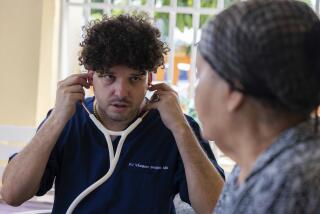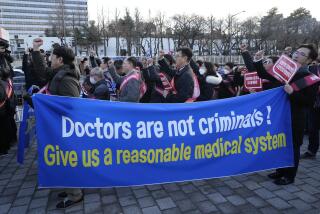Yugoslavs Must Hunt for Doctors, While the Doctors Must Hunt for Jobs
- Share via
ZAGREB, Yugoslavia — A long climb up steep stairs challenges any would-be visitor to the apartment where Dr. Frane Jelavic runs his medical practice. His radiological equipment seems aged, and his services--unlike those of doctors who work for the state--are not free.
Nevertheless, the crowd of patients that packed Jelavic’s waiting room one recent afternoon was evidence of the thriving practice he says private physicians can enjoy in Yugoslavia’s Republic of Croatia. The reasons are simple: Free state hospitals and clinics are often overcrowded and inefficient, and private medical care is in short supply.
But in the anarchic world of Yugoslav-style Communism, this is only the beginning of Jelavic’s story. The problem here, he says, is not only a scarcity of doctors, but doctors’ unemployment. And although patients are looking for doctors, and doctors are looking for jobs, the local government has neither hired the unemployed nor allowed more physicians to enter private practice.
“That’s our politics; nobody can explain why things work this way,” Jelavic said with a weary air. “If the doctors had their way, or the patients had their way, there would be private doctors all over Yugoslavia. Most of the unemployed doctors would be working. But it can never be that simple.”
Complicated Economy
The strange predicament of health service here is a classic example of how complicated--and distorted--Yugoslavia’s economy and social affairs have become under its unorthodox socialist system. Since former leader Josip Broz Tito broke with the Soviet Union nearly 30 years ago, the country has been rebuilt on the principle of a highly decentralized “self-management” of government and the economy.
The idea has been to mix state ownership and one-party rule with a capitalist marketplace and local democracy. In the years since Tito’s death, however, critics say a rudderless Yugoslavia has come to mix the drawbacks of the systems it straddles: high unemployment, poor services, haphazard planning and wasteful investments.
The muddle of health care in Croatia, typically, only grows on a national scale. About 8% of Yugoslavia’s physicians are jobless, even though its 22 million people have less access to doctors, on average, than most nations in Europe and several in Latin America.
No local authority has been willing to attack the problem through private enterprise. The 70 private doctors left in Croatia are the only ones allowed in the country. At the same time, a state-planned approach has also been nixed. Although a third of graduating medical students have no prospect of employment, the 13 government-operated medical schools have declined to reduce enrollments.
‘Lack of Coordination’
“We have a surplus of doctors in some republics and cities, and a scarcity in some rural areas. Then we have a lack of coordination between the number of students and the real possibility to employ them,” said Dragoljub Urosevic, head of the Assn. of Medical Societies of Yugoslavia. “But we do not have the power to order organizations to receive doctors or tell doctors where to work. The situation is not easy to control.”
As doctors and health administrators tell it, the roots of the problem lie in Yugoslavia’s most common dilemma: the relative lack of central authority combined with strong and competing local authorities in each of the six republics and two autonomous regions. The result is staggering differences in the quality of health care around the country and stubborn resistance to either the central controls or increased economic freedoms that might alleviate the trouble.
Unlike the centrally planned countries of the Soviet Bloc, Yugoslavia has in principle turned over control of health care to local communities. Each of the nation’s 11,800 communes is supposed to decide separately on how much it will spend on medical care, how many doctors it will employ and how much--if anything--citizens will have to pay for service.
Since some areas of the country are far more affluent than others, the result is that the supply of doctors ranges from one for every 400 persons in the northwestern republic of Slovenia--a figure far superior to Switzerland--to one for every 1,100 persons in the poor region of Kosovo, a lower ratio than in the Ivory Coast. Kosovo, moreover, has unemployed doctors, while Slovenia has none.
‘A Tolerable Difference’
“That’s actually a tolerable difference,” said Branko Pocek, director of the Federal Institute for Health Protection, invoking a distinctly Yugoslav logic. “After all, per capita income in Slovenia is four times greater than that in Kosovo.”
The problem might be limited to poor distribution of doctors, but the rivalries and autarchic practices of the leaderships of local republics also have led to the overbuilding of medical schools. Each of the eight federal jurisdictions has built one or more in recent years, often ignoring similar schools in neighboring regions and the resulting surplus of students.
“As long as things were going well and we were growing economically in the 1970s, the problem did not seem acute,” Pocek said. But when Yugoslavia entered an economic slump beginning four years ago, salaries and jobs for doctors began shrinking. Now, Pocek said, 2,300 students graduate from the 13 medical facilities annually, while only about 1,500 new jobs were opening up.
Health officials tried to attack the problem by reducing the number of medical students. That required arduous negotiations among the eight jurisdictions to determine where cuts would be made. A plan was agreed on two years ago but, Pocek said, “the fact is that the schools don’t observe it. The numbers remain the same.”
“There’s a political factor involved, because parents press the local authorities to let students in. Each one thinks he can work out for himself later how to get a job.”
Measure Proposed
The students, for their part, have called on health officials and republican authorities to allow private medical practice, a measure that many doctors say would quickly reduce the unemployment rolls and take the pressure off local government health services. Health officials acknowledge that the step might induce some of the many Yugoslav doctors now practicing abroad to return.
The measure has been repeatedly blocked, however, by resistance from health administrators in each republic whose control over medical practice would be threatened by free enterprise.
“We have been debating this question for 10 years, but we haven’t been able to make a decision yet,” Urosevic said. “The best we can do is try to push those who are working to do better.”
Jelavic, the head of the association of private doctors in Croatia, confessed that he has all but given up on solutions. “The doctors don’t understand it, but then no one understands our politics,” he said. “Even if our president were to meet with President Reagan, he couldn’t explain how it works.”
More to Read
Sign up for Essential California
The most important California stories and recommendations in your inbox every morning.
You may occasionally receive promotional content from the Los Angeles Times.










